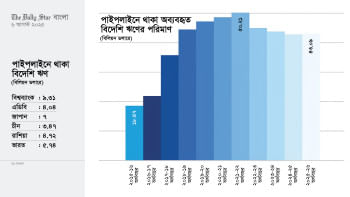A blatant disregard for university rules, regulations

Defying clear provisions of its examination ordinance, the Academic Council of Jahangirnagar University has decided to publish the MPhil Part-1 result of a former student and ex-JCD leader -- nearly two decades after he failed the examination.
Abdul Hai Mollick, former president of Jatiyatabadi Chhatra Dal's JU unit, enrolled in the History department's MPhil programme during the 2004-05 academic session.
Mollick, also known as Pervez Mollick, appeared for part-1 MPhil courses 501 and 504 (kha) in 2005 but failed course 501. That same year, he submitted an application seeking re-evaluation of his answer script -- despite the university ordinance prohibiting such reviews.
In 2006, then vice-chancellor Prof Khandaker Mustahidur Rahman invoked his special authority under Section 12 (3) of the JU Act, 1973, and permitted a re-evaluation. The script was sent to a third examiner, but the result was never published, according to documents reviewed by The Daily Star.
Nearly 20 years later, Mollick -- now senior joint secretary of BNP's UK unit -- submitted a fresh application in April to current VC Prof Mohammad Kamrul Ahsan, requesting publication of his result.
The VC referred the matter to a committee tasked with resolving exam-related disputes.
Chaired by pro-VC (Academic) Prof M Mahfuzur Rahman, the committee met on May 18 and sought the opinion of the Departmental Higher Education Committee, which recommended considering Mollick's request.
The committee met again on June 19 and suggested publishing Mollick's result based on either the first or second examiner's evaluation. The matter was forwarded to the Academic Council.
On June 23, the Academic Council, chaired by the VC, recommended publishing the result solely based on the first examiner's marks. The university's syndicate approved the decision.
The Daily Star independently reviewed Mollick's application, the Examination Controller's letter to the department, the departmental higher education committee chairman's opinion, and meeting minutes of the committee for resolving exam disputes -- and found procedural anomalies and violations of the examination ordinance.
PROCEDURAL ANOMALIES
In his latest application, Mollick claimed he received 56 marks from the first examiner, 41 from the second, and 61 from the third in course 501. He cited individual question scores, noting one examiner awarded him 13 marks for a question, while another gave zero. He scored 48.5 in course 501 and 59 in 504 (kha).
The pass mark for each course is 50. As per JU's ordinance for the MPhil degree, if a candidate fails any course, their admission to the programme shall be cancelled.
The ordinance also prohibits students from accessing detailed marks before official publication.
Prof ATM Atiqur Rahman, chair of the Departmental Higher Education Committee, and the exam dispute committee confirmed the accuracy of Mollick's cited scores -- excluding those from the third examiner.
Dr AFM Shamshur Rahman of Rajshahi University was appointed the third examiner on August 6, 2006.
On June 19, 2025, JU contacted RU, which confirmed the result remained unresolved following Dr Shamshur's death long ago.
"We never received the third examiner's marks. The average of the two available evaluations was 48.5 -- just below the pass mark. The Academic Council recommended publishing his result based on the first examiner's marks," said Prof Saleh Ahammad Khan, a council member.
Asked whether this was permitted under the ordinance, Prof Saleh admitted, "The ordinance doesn't explicitly allow it, but there have been precedents."
However, he could not cite any specific case. "Mollick was given the benefit of the doubt," he said.
Prof Saleh, also acting controller of examinations, acknowledged that Mollick's script didn't qualify for a third evaluation.
Under Section 25 (b) of the 2003 ordinance, a third evaluation is allowed only when the marks from the first two examiners differ by more than 20 percent. In this case, the difference was 15 percent -- below the threshold.
Asked how Mollick accessed detailed marks, Prof Saleh said, "It's completely illegal. I don't know how he got it. The administration should've investigated."
Deputy Controller of Examinations AFM Nazrul Islam confirmed, "There is no record of any other student's script being re-evaluated under a VC's special authority after failing."
"Nor is there precedent for publishing a result solely based on the first examiner's marks when a second evaluation exists," he said.
Former JU proctor Prof Muhammad Ali Akond said Mollick was initially ineligible for MPhil admission but was enrolled due to the influence of certain teachers.
"I filed a formal complaint about the irregularities with the education adviser to the 2007 caretaker government," he also said.
"Now, twenty years later, the only reason behind publishing the result is serving ill motives of the current administration and certain unethical teachers," he said.
Various media outlets at the time of his admission to MPhil programme reported that Mollick was admitted to the programme in violation of the rules.
A reliable source recently confirmed to The Daily Star that Molllick initially did not meet the eligibility criteria for the MPhil program, which requires 55 percent marks in either the bachelor's or master's degree and at least 50 percent in the other.
"One of his results was below the requirement," the source said.
However, Prof Saleh said the admission could be valid under section 2.1.3 of the ordinance, which allows the Board of Advanced Studies to relax the criteria upon recommendation from the departmental MPhil committee.
Contacted, Mollick claimed his MPhil supervisor Dr Enamul Huq Khan shared the marks with him.
He alleged that personal bias by Prof Hasina Matin, then chair of the Departmental Higher Education Committee of the history department, caused him to fail.
These claims could not be independently verified. Dr Enamul is deceased, and Prof Hasina could not be reached.
Mollick said, "Students with lesser qualifications than mine were admitted. So why wouldn't I be? The Academic Council recommended it."
JU VC Prof Kamrul said keeping a student's result pending for so long was wrong. "Every student has a right to their result," he said.
He also said in the Arts faculty, a drastic variation in scores -- 13 versus 0 -- for the same answer was "absurd."
"That's why the council decided to publish the result based on the first examiner's marks. We could have declared him failed based on the second examiner's, but he was given the benefit of the doubt," he added.

 For all latest news, follow The Daily Star's Google News channel.
For all latest news, follow The Daily Star's Google News channel. 



Comments